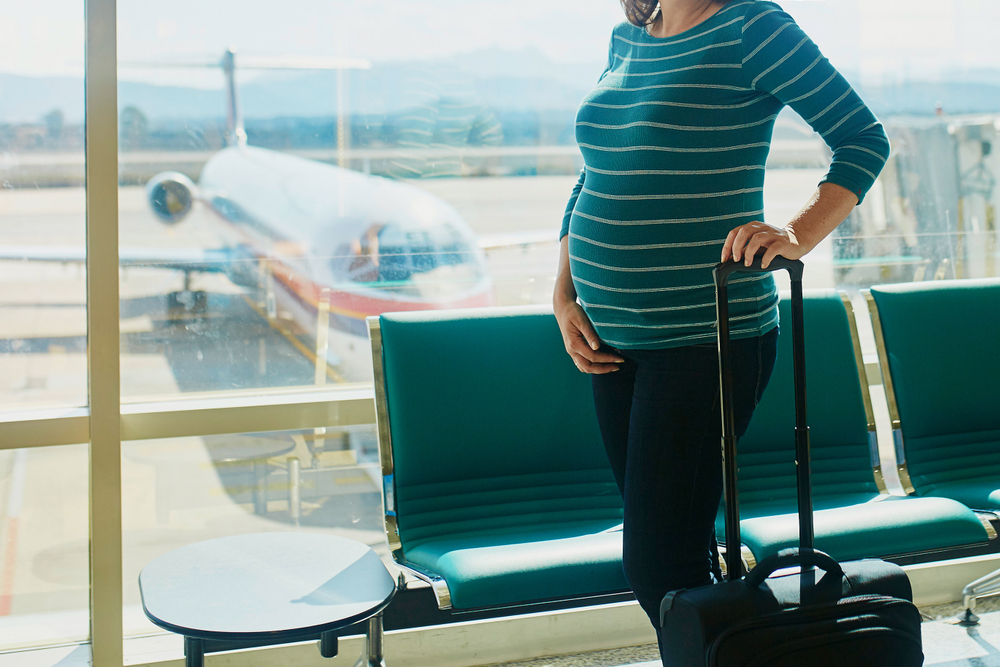Embracing the journey of pregnancy doesn’t mean you have to put your travel aspirations on hold. With the proper precautions, adequate planning, and understanding of your body’s unique needs, traveling during pregnancy can be a delightful experience.
Understanding the Best Time to Travel
Typically, the second trimester (14-28 weeks) is considered the safest and most comfortable time to travel during pregnancy. By this time, morning sickness often subsides, energy levels can be higher, and the risk of miscarriage has significantly decreased. However, every pregnancy is unique, so it’s essential to consult with your healthcare provider before planning any travel.
Considerations for Air Travel
If your journey involves flying, it’s crucial to understand the airlines’ policies regarding pregnant passengers. Here are some points to consider:
- Airline Policies: Many airlines have policies regarding travel during the late stages of pregnancy. Ensure to check these before booking.
- Flight Duration: Long flights can increase the risk of deep vein thrombosis (DVT). Keep your legs moving, do stretching exercises, and consider wearing compression stockings.
- Hydration and Nutrition: Air travel can be dehydrating. Maintain hydration levels and carry nutritious snacks to keep energy levels up.
- Seat Selection: An aisle seat will allow you more space and ease for frequent bathroom trips.
Safe Road Travel during Pregnancy
Car travel can offer flexibility, but there are important safety tips to consider:
- Seatbelt Use: One of the most important aspects of car safety during pregnancy involves correctly using seatbelts. Wearing a seatbelt properly can reduce the risk of injury to you and your baby in the event of a sudden stop or accident. The lap belt should be positioned securely across the pelvis, resting comfortably below your baby bump, and over your hip bones. This helps to direct the pressure and force of a sudden stop or impact away from your abdomen. The shoulder strap should be worn between your breasts and to the side of your belly, avoiding any direct pressure on your stomach. Remember, seatbelts should be worn snugly, ensuring they restrain your body appropriately while also maintaining comfort.
- Breaks: Extended periods of sitting during car travel can cause discomfort and swelling in your legs, making regular breaks an essential aspect of your journey. Stopping every two hours is advisable, allowing you to move around, stretch, and promote better blood circulation. These breaks also allow for bathroom visits, hydration, and snacking – crucial aspects of maintaining your comfort and wellness during travel. Furthermore, these pauses can also reduce the risk of developing deep vein thrombosis (DVT), a potential concern for pregnant women during long periods of inactivity.
- Airbags: While airbags are an essential safety feature, incorrect positioning in the car could lead to injury in the event of their deployment. To mitigate this risk, ensure that there is a safe distance between your belly and the dashboard or steering wheel. The best way to achieve this is by reclining the seat slightly and moving it back while still maintaining the ability to reach the pedals comfortably. If your car has the option, tilt the airbag towards your chest rather than your belly for added safety.
Safe road travel during pregnancy involves a combination of proactive measures, understanding safety features, and respecting your body’s unique needs during this critical period. By following these guidelines, you can enjoy the flexibility and freedom of road travel, ensuring you and your baby’s safety and comfort on your journeys.
Cruise Travel Considerations
Cruise travel requires some specific considerations:
- Medical Facilities: Check if the cruise line has adequate medical facilities onboard and a doctor with experience in maternity care.
- Itinerary: Consider a cruise itinerary that includes ports with good medical facilities.
- Motion Sickness: Pregnancy can increase susceptibility to motion sickness. Discuss safe medication options with your healthcare provider.
Health and Wellness Tips
Wherever your travels take you, adhering to a few general health tips can ensure your well-being and safety:
- Stay Hydrated and Nourished: Keeping up with hydration and nutrition is paramount. Always carry a water bottle and healthy snacks.
- Comfortable Clothing: Wear loose, comfortable clothing and shoes to accommodate swelling.
- Medical Records: Carry a copy of your prenatal medical records and a list of emergency contacts.
- Travel Insurance: Ensure you have travel insurance that covers pregnancy-related emergencies.
- Vaccinations: Check if any vaccinations are required for your destination and if they’re safe during pregnancy.
- Avoid High-Risk Activities: Steer clear of adventure activities that risk falling or injury.
Embarking on Safe Travel During Pregnancy
Traveling during pregnancy doesn’t have to be daunting. By considering the timing, understanding the guidelines for different modes of travel, and prioritizing your health and well-being, you can embark on memorable adventures during this significant time in your life.
Your journey to motherhood can indeed coexist with your desire for exploration and adventure. As you navigate this unique journey, remember that every decision you make affects you and your developing baby. Open communication with your healthcare provider and understanding your body’s unique needs will support you in making informed decisions that will ensure safe and enjoyable travels during your pregnancy.
By carefully planning and prioritizing your well-being, you can turn travel into a source of joy and relaxation during pregnancy. Whether traveling for work, visiting loved ones, or satisfying your wanderlust, understanding the nuances of traveling during pregnancy ensures that your journeys are memorable and stress-free. So, buckle up (safely) and get ready to explore the world as you journey into this beautiful phase of life. The world is your oyster, and pregnancy is just another exciting adventure along your path. Safe travels!
Sources:
- American Pregnancy Association. (2021). Traveling During Pregnancy. Retrieved from https://americanpregnancy.org/healthy-pregnancy/is-it-safe/traveling-during-pregnancy-1195/
- Mayo Clinic. (2021). Pregnancy and travel: What you need to know. Retrieved from https://www.mayoclinic.org/healthy-lifestyle/pregnancy-week-by-week/expert-answers/pregnancy-and-travel/faq-20057836
- Centers for Disease Control and Prevention. (2021). Travelers’ Health: Pregnant Travelers. Retrieved from https://wwwnc.cdc.gov/travel/yellowbook/2020/family-travel/pregnant-travelers








